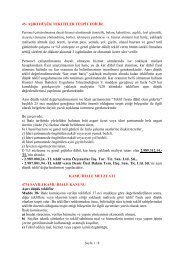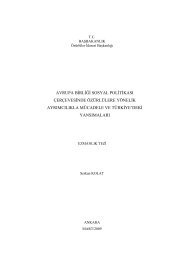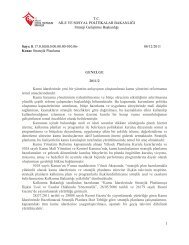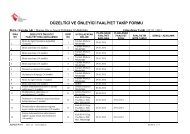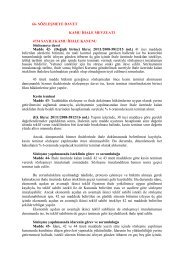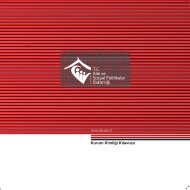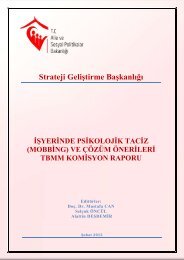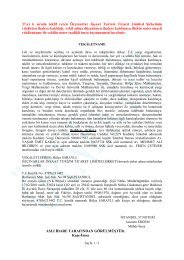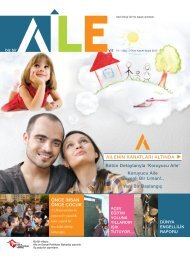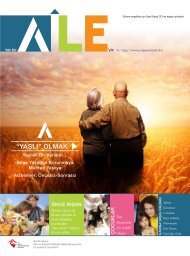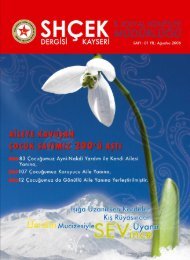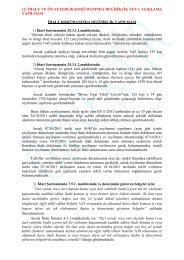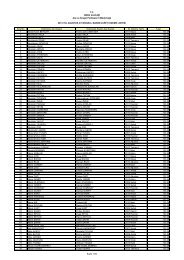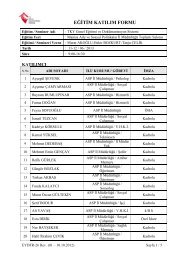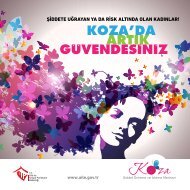Sosyal PolÄ°tÄ°ka tÄ°ka - EÄitim ve Yayın Dairesi BaÅkanlıÄı - Aile ve ...
Sosyal PolÄ°tÄ°ka tÄ°ka - EÄitim ve Yayın Dairesi BaÅkanlıÄı - Aile ve ...
Sosyal PolÄ°tÄ°ka tÄ°ka - EÄitim ve Yayın Dairesi BaÅkanlıÄı - Aile ve ...
- No tags were found...
You also want an ePaper? Increase the reach of your titles
YUMPU automatically turns print PDFs into web optimized ePapers that Google loves.
A CRITICAL ASSESSMENT ON THE CONDITIONAL CASH TRANSFER PROGRAMME<br />
IN THE CONTEXT OF GENDERED POVERTY IN TURKEY<br />
Mehmet Ali KÜÇÜKÇAVUŞ<br />
Table III. Formal Education Le<strong>ve</strong>ls and Gender in 2008 according to National<br />
Education Database<br />
2008 (%) Illiterate<br />
Literate<br />
without<br />
diploma<br />
Primary<br />
School<br />
Elementary<br />
Junior high<br />
school &<br />
equivalent<br />
High<br />
school &<br />
equivalent<br />
Higher<br />
education<br />
Master<br />
Degree<br />
PhD<br />
Unknown<br />
Female* 18,0 7,4 42,7 0,7 4,9 12,2 6,5 0,5 0,1 7,0<br />
Male* 4,5 4,9 42,8 1,0 9,0 18,8 10,2 0,8 0,2 7,7<br />
*Percentage of population who were 25 years old and o<strong>ve</strong>r in 2008<br />
Source: TURKSTAT, 2008<br />
E<strong>ve</strong>n though the statistics on health and gender relation are inadequate and most of<br />
data are outdated, se<strong>ve</strong>ral studies indicate that gender differences in Turkey constitute<br />
one of major factors disrupting the utilisation of health care system (Akin, 2003,<br />
p.54). These studies also re<strong>ve</strong>al that health status of women is worse than men (Akin,<br />
2003, p.55) and women are unable to enjoy the existing rights and services duly and<br />
properly (KSMG, 2008, p.5).<br />
These abo<strong>ve</strong> mentioned inequalities and disparities in employment, education and<br />
health sectors that women are exposed and higher risk of falling into po<strong>ve</strong>rty of women<br />
ha<strong>ve</strong> pronouncedly exhibited that po<strong>ve</strong>rty has clear gendered nature in Turkey.<br />
In practise, detailed national action plan equality and se<strong>ve</strong>ral strategy papers ha<strong>ve</strong><br />
accordingly been prepared to ensure gender equality (General Directorate on the Status<br />
of Women, 2008a). Howe<strong>ve</strong>r, this article does not aim at assessing and criticising<br />
general policies and strategies for gender equality .On the other hand, it will discuss<br />
the impacts of a specific po<strong>ve</strong>rty reduction program which was designed to remedy<br />
gendered po<strong>ve</strong>rty and to break intergenerational transmission of po<strong>ve</strong>rty through<br />
by strengthening women’s role in poor families. Therefore, the next sections of this<br />
article will focus only on this specific programme.<br />
3. Social Assistance Programmes <strong>ve</strong>rsus Gendered Nature in Turkey<br />
This section will provide <strong>ve</strong>ry brief information on the social assistance programmes<br />
and especially focus on Conditional Cash Transfer (CCT) programme carried out in<br />
Turkey by the General Directorate for Social Assistance (GDSA) that is the main public<br />
institution responsible for planning, financing and implementing countrywide po<strong>ve</strong>rty<br />
reduction and social assistance programmes. In order to pre<strong>ve</strong>nt any digression,<br />
other relati<strong>ve</strong>ly small and narrow scoped programmes or activities of local institutions<br />
will be excluded. Before descending to particular aspect of the CCT programme,<br />
it is necessary to mention generally about social assistance programmes which will<br />
be referred as traditional po<strong>ve</strong>rty reduction or social assistance programmes henceforward.<br />
53



